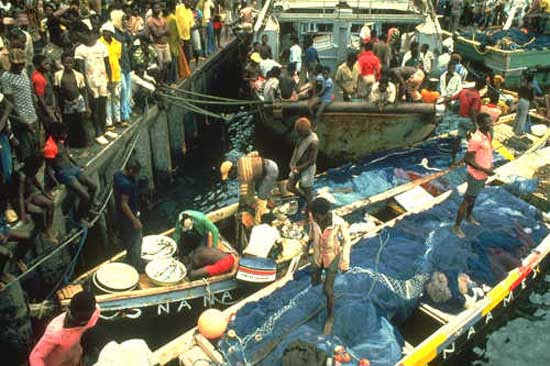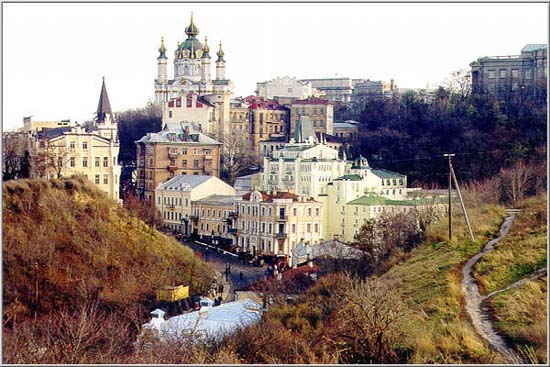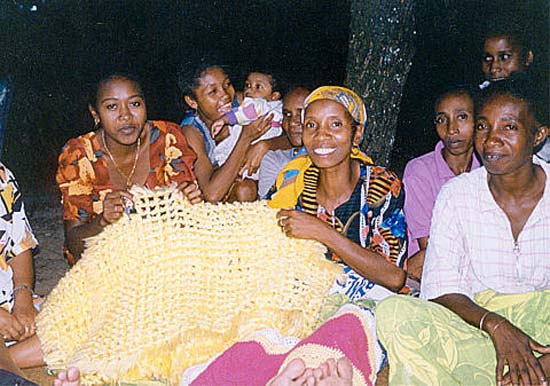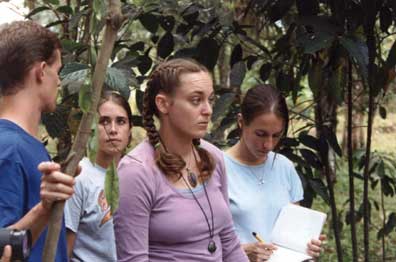February 5, 2004 - Department of State: Gaddi Vasquez writes that Peace Corps Volunteers pave the way for entreprenuers to enter the market economy
Peace Corps Online:
Peace Corps News:
Headlines:
February 2004 Peace Corps Headlines:
February 5, 2004 - Department of State: Gaddi Vasquez writes that Peace Corps Volunteers pave the way for entreprenuers to enter the market economy
Gaddi Vasquez writes that Peace Corps Volunteers pave the way for entreprenuers to enter the market economy

Read and comment on this article written by Peace Corps Director Gaddi Vasquez on the work that Peace Corps Volunteers are doing to pave the way for entreprenuers to enter the market economy at:
Peace Corps Volunteers Pave Way for Entrepreneurs, Vasquez Says*
* This link was active on the date it was posted. PCOL is not responsible for broken links which may have changed.
Peace Corps Volunteers Pave Way for Entrepreneurs, Vasquez Says
Help small businesses access market economy, agency's head adds
(The following article appears in the February 2004 issue of the State Department's electronic journal, Economic Perspectives. The issue is titled "Microenterprise: Laying the Foundation for Economic Development." The entire journal can be viewed at: http://usinfo.state.gov/journals/journals.htm).
(begin byliner)
PAVING THE WAY FOR ENTREPRENEURS TO ENTER THE MARKET ECONOMY
By Gaddi Vasquez
Director
U.S. Peace Corps
(The Peace Corps focuses on underserved segments in the countries in which it serves, particularly women and youth, in its support for community-based small businesses and microenterprises, says Director Gaddi Vasquez. By providing training in entrepreneurial, business management, and leadership skills, and establishing youth business clubs to help young people put their skills to use, Peace Corps volunteers are helping countries develop new links to domestic and international markets. "Where volunteers once constructed wooden bridges, the 21st century Peace Corps volunteer builds economic bridges by paving the way for entrepreneurs to enter the market economy," Vasquez says.)
The U.S. Peace Corps is promoting development of community-based small businesses and microenterprise projects in many of the world's poorest countries. By combining traditional business management training with innovative information technologies, Peace Corps volunteers are nurturing new entrepreneurs and helping them to create links between developing country suppliers and domestic and international markets.
From Africa and Latin America to Central and Eastern Europe, the Peace Corps has provided assistance to hundreds of thousands of entrepreneurs the past 43 years. What separates the Peace Corps approach from those of other development agencies is its cadre of skilled volunteers who understand the local language, culture, and markets and who live and work in local communities where they integrate community members in every facet of their projects.
With the fall of the communist era in the late 1980s and the rise of market economies in Central and Eastern Europe and the former Soviet Union, the Peace Corps launched in the region a number of formal Small Enterprise Development (SED) projects. At the same time, volunteers continued to build on the cooperative movement in Latin America and advance the tradition of entrepreneurship in Africa and Asia. The goal of these projects was to impart entrepreneurial skills while strengthening the capacity of local organizations and service providers that assist micro and small businesses.
The Peace Corps now has stand-alone SED projects in 36 countries around the world and promotes SED activities in almost all of the more than 65 other country programs it operates. In fiscal year 2002, close to 1,000 SED volunteers assisted more than 80,000 individual entrepreneurs and 8,000 service providers and organizations. Where volunteers once constructed wooden bridges, the 21st century Peace Corps volunteer builds economic bridges by paving the way for entrepreneurs to enter the market economy.
Building Community Support

After 12 weeks of intensive language, cross-cultural, health, safety and security, and technical business training in the Ukraine, Peace Corps volunteer Jon Daigle was assigned to the Division of Economy in Khmelnytsky Oblast, or governmental region.
With his newfound knowledge of the Ukrainian language, and local business and cultural norms, as well as his understanding of the country's economic situation, Daigle worked with local colleagues to promote "economic cluster development," an economic model that encourages interdependence among local businesses within a particular industry.
Daigle assisted his colleagues to design and implement a seminar that promoted economic investment in the oblast and at the Ukrainian Stock Exchange in Kyiv. He also helped his colleagues develop an investment promotion program to attract funds from the United States and Europe. As a result of these efforts, the national Micro-Finance Bank opened a branch office in Khmelnytsky to provide seed loans to small and medium sized enterprises in the region. The next step for the oblast administration is to open a business-training center for potential clients of the Micro-Finance Bank.
A much smaller community in another part of the world, Dagana, Senegal, is a departmental capital (there are three departmental capitals per region, which is equivalent to a oblast) with a population of 25,000 located 80 miles from the regional capital of Saint Louis. Dagana is a cultural crossroads rich in traditional art of the Wolof, Peulh, and Moor ethnic groups. Unfortunately, few tourists visit the community and few festivals and other cultural events take place there. This makes it difficult for traditional artisans to sell their products or to create linkages that would allow them to reach larger markets.

After hearing about the work that other Peace Corps volunteers had done at an arts and crafts fair during Senegal's annual Saint Louis Jazz Festival, Volunteer Erika Miller recognized an opportunity to promote both Dagana's artists and the city as a tourist destination at the next festival. With Miller's guidance, Dagana's mayor agreed to sponsor a promotional project with the modest amount of $320.
Part of the mayor's money was used to pay for a booth at the Saint Louis fair as well as transportation and lunches for the artists. Miller persuaded six artists to part from their families -- a difficult feat in this rural area --- and to bring their works to the festival. She helped each artist to create a publicity book, teaching them an important marketing principle. After the artists arrived, they toured local galleries to market their products. Another portion of the mayor's grant was used to create a Dagana tourism promotion committee, which produced a tourism promotional brochure under Miller's guidance. Upon her return to Dagana after the festival, the community hailed Miller's efforts in helping Dagana "get on the map."
Both Daigle in Ukraine and Miller in Senegal were successful in getting their communities noticed in larger markets and in attracting investment. They are representative of volunteers in practically all Peace Corps countries who leverage their understanding of the local business environments and their cross-cultural skills to gain the trust of their local colleagues, identify new opportunities, and facilitate economic development.
A Model for Microenterprise Development
The Peace Corps approach involves host country partners in the entire process -- from project planning and training design to participation in pre- and in-service training and project implementation. Buy-in and ownership of Peace Corps activities by the Khmelnytsky Oblast administration in Ukraine and by Dagana in Senegal were essential to achieving sustainable results that met local needs.
Buy-in cannot be achieved unless the community sees a project's relevance to local needs, particularly underserved segments such as youth and women. The Peace Corps tries to ensure such relevance by managing projects not from its Washington headquarters but through its country headquarters. It is the country offices that assign volunteers to work alongside host country counterparts. Both parties are involved in making sure that the work is relevant to local development needs and that the training of local staff is adequate to sustain project activities after the volunteers depart. These activities often include counterparts providing training in organizational management and business practices to members of international or local nongovernmental organizations or community-based organizations such as a farmers cooperatives or artisan associations, as well as to individual micro and small entrepreneurs.
In the developing world, women cultivate 80 percent of all the food produced and make up one third of the world's wage-labor force. As microenterprise managers, women in Africa, Asia and Latin America produce and sell produce, processed food, and handicrafts. Volunteers often work directly with women's cooperatives, as well as with microfinance institutions, to help women access the appropriate training, business advice, and financial resources to start and expand their businesses.

For example, at the beginning of her tour in 2000 in Togo, one Peace Corps volunteer initiated a Tontine Tatchoyim, a revolving credit group for women. After three years of operation, the Tontine continues to grow and thrive. The group now has enough funds to open bank accounts, reinvest in businesses, and pay for the education of members' children.
This system allows group members to keep their money safe from the social pressures (such as demands from family or community members for a share of the profits) to which small businesses often fall prey. Tontine Tatchoyim, which started with no funds, now has an annual income of 400,000 CFA, the common currency of 14 African Countries, or about $800.
The world has some 1.2 billion youth between the ages of 10 and 19, and 87 percent of them live in developing countries. Despite shrinking government payrolls in many developing countries, young people often expect to be hired by the state upon completion of secondary school. In many of the countries Peace Corps serves, the lack of jobs for this growing demographic group has led to an increase in youth crime, particularly in urban areas. To change attitudes and provide opportunities for the future, Peace Corps volunteers have been training out-of-school and in-school youth in entrepreneurial, business management, and leadership skills while establishing youth business clubs to help young people put their skills to use.
In coordination with Nicaragua's Ministry of Education, Sports, and Culture, volunteer Joran Lawrence developed entrepreneurial and business skills among youth in local high schools, youth centers, and homeless youth shelters. More than 300 young Nicaraguans took part in these training activities. As a result, a group of youth started a T-shirt printing business, and the profits were used to fund an educational campaign to combat the spread of HIV/AIDS.
Innovation in Project Implementation
Peace Corps volunteers are responding to a growing need for expertise in business sub-sectors such as Information and Communications Technology (ICT), microfinance, and ecotourism --- growing areas that provide opportunities for local, regional, and international investment.
Volunteers find business solutions for microenterprises through the implementation of computerized accounting systems, inventory databases, and Internet access. They use local radios to transmit information about successful practices in business management to people around the country and disseminate current market prices to farmers. ICT helps lenders track client loans and uses the Global Positioning Systems (GPS) to provide virtual addresses where street names don't exist.
Peace Corps volunteers also help increase reimbursement rates for microfinance institutions by providing the necessary business training to potential clients and loan recipients, increasing the rates of on-time payments and business profitability. Volunteers also promote equitable community involvement in managing and operating ecotourism sites as businesses that serve both the needs of the community and of tourists. Microenterprises involved with the sites benefit from volunteer-provided training in the "4 Ps" of marketing -- price, product, placement, and promotion -- as well as in quality control, hospitality, and accounting.
Promising Practices
During the two years that they normally spend in their host-nation communities, SED Peace Corps volunteers take as their guiding principle the old adage that teaching a man how to fish is better than giving him a fish to eat. But these volunteers go beyond teaching the basics "of fishing" to train women, men, and young people to create linkages between suppliers, producers, and buyers; explore opportunities for access to credit; market their products, and strengthen the organizations that will support their business efforts over the long term.
Whether assisting local staff to transform a school's resource center into a self-sustaining IT microenterprise in Panama or training members of a women's association in Nepal to sell their handicrafts on the Internet, Peace Corps volunteers have contributed to the overall development of hundreds of thousands of communities. Key to their success has been the ability and willingness of volunteers to become full members of their host communities. By speaking the local languages, understanding the cultural norms and mores, and living more or less as their neighbors live, volunteers are laying foundations for sustainable development and prosperity. Host country nationals, meanwhile, are gaining, along with a foothold in the global economy, a greater understanding of Americans. Open communication, mutual respect, and collaboration are the tools paving the way.
(end byliner)
(Distributed by the Bureau of International Information Programs, U.S. Department of State. Web site: http://usinfo.state.gov)
Click on a link below for more stories on PCOL
Read the series on Safety and Security here

Leave your comments on the series below.
Read comments by RPCVs here, here and here.

Some postings on Peace Corps Online are provided to the individual members of this group without permission of the copyright owner for the non-profit purposes of criticism, comment, education, scholarship, and research under the "Fair Use" provisions of U.S. Government copyright laws and they may not be distributed further without permission of the copyright owner. Peace Corps Online does not vouch for the accuracy of the content of the postings, which is the sole responsibility of the copyright holder.
This story has been posted in the following forums: : Headlines; Peace Corps Directors - Vasquez; Small Business; Entreprenuership; COS - Ukraine; COS - Senegal; COS - Togo
PCOL9966
47
.
Hi,
It is encouraing to note that Peace Corps Online exists. I have just completed construction of Belbur Information Technology Centre near Egerton University in Kenya and now I am looking for support to equip the centre with some computers, LCD projectors, and Internet connection.
I am requesting that you consider assisting this rural project in some way.
Thak you.






